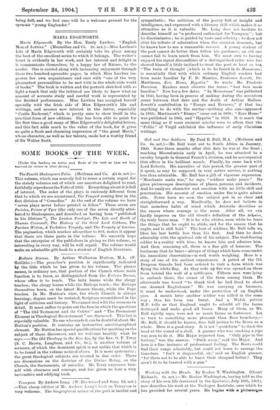sympathetic ; the criticism of the poetry full of insight
and intelligence, and expressed with a literary skill which makes it as attractive as it is valuable. Mr. Lang does not hesitate to describe himself as "a professed enthusiast for Tennyson "; but he discriminates ; he is guided by taste and sobriety ; he does not stint his tribute of admiration when the occasion demands, but he knows how to use a reasonable reserve. A young student of the poet cannot do better than follow his guidance ; an old one cannot fail to learn much from him. We must own to having enjoyed his signal discomfiture of a distinguished critic who has showed himself a little inclined to treat the poet tie haul en Las. "The train of thought [which is to be found in In Memoriam] is essentially that with which ordinary English readers had been made familiar by F. D. Maurice, Professor Jowett, Dr. Martineau, Ecce Homo, Hypatia." So wrote Mr. Frederic Harrison. Readers must observe the tense "had been made familiar." Now for a few dates. "In Memoriam" was published in 1850, having been in process of making during the seventeen years between that date and the death of Arthur Hallam Jowett's contribution to "Essays and Reviews," if that has anything to do with the matter—nothing else can—appeared in 1853; Martineau's "Essays" came out in 1868; " Ecce Homo" was published in 1865, and "Hypatia " in 1853. It is much the same thing as if some eminent scholar were to -affirm that the "Pollio " of Virgil exhibited the influence of early Christian -writings.






































 Previous page
Previous page